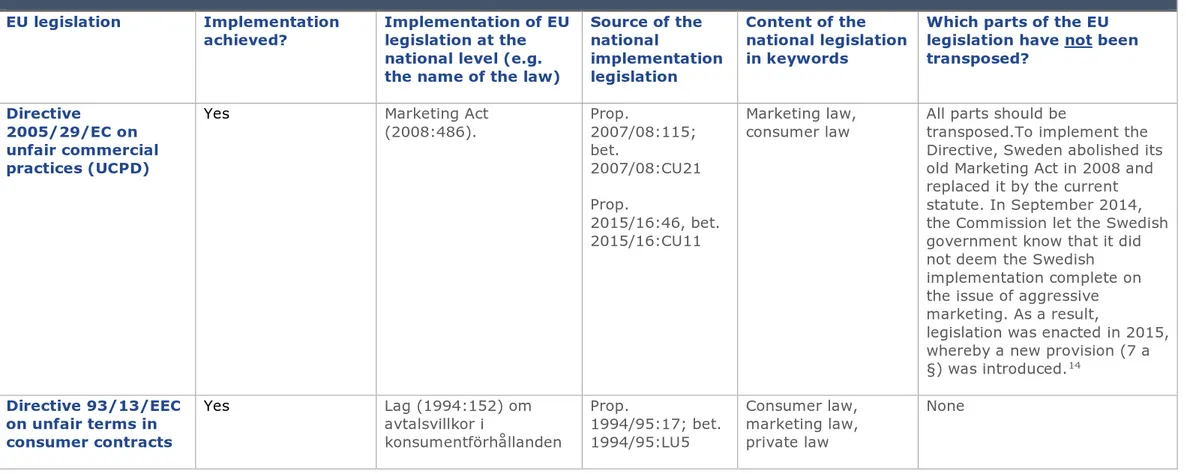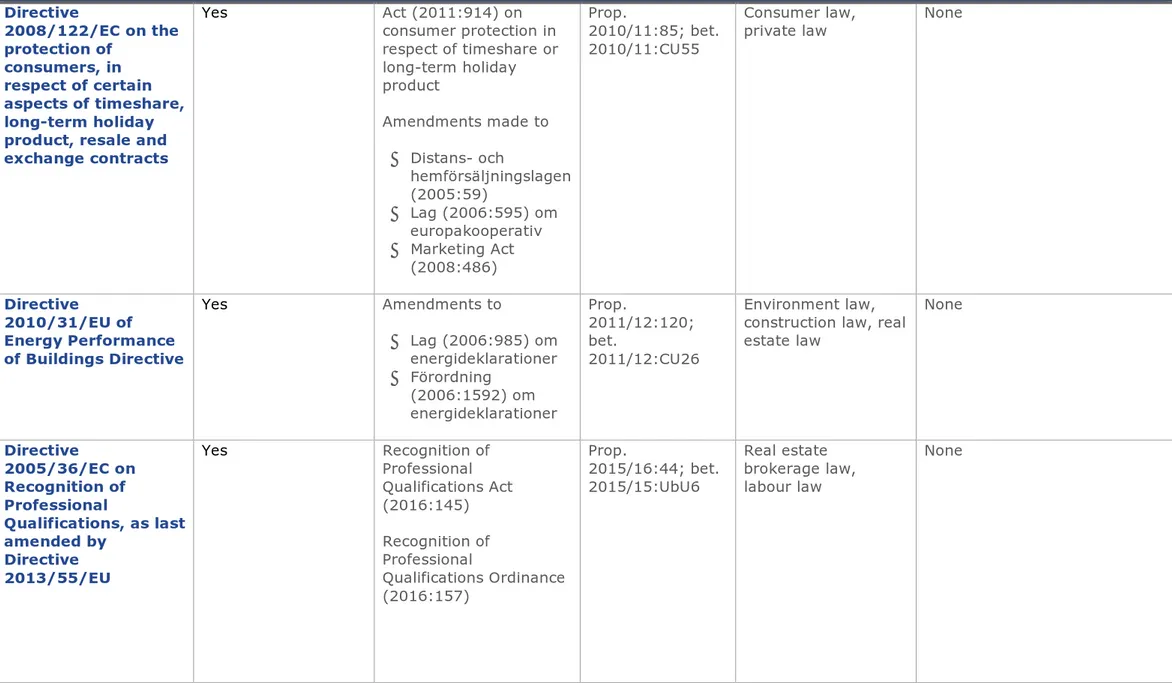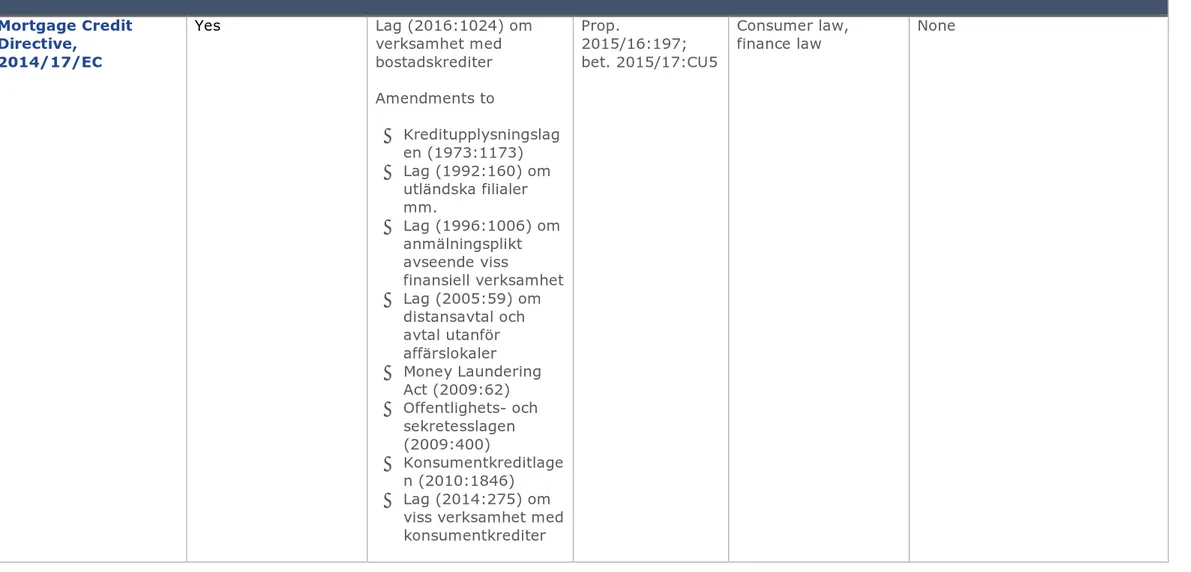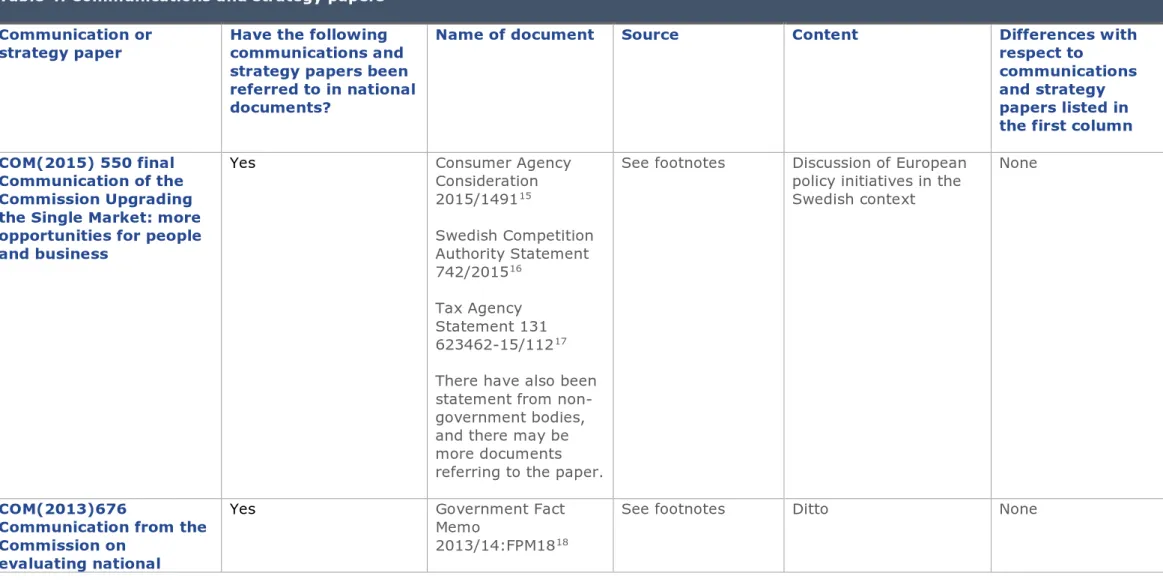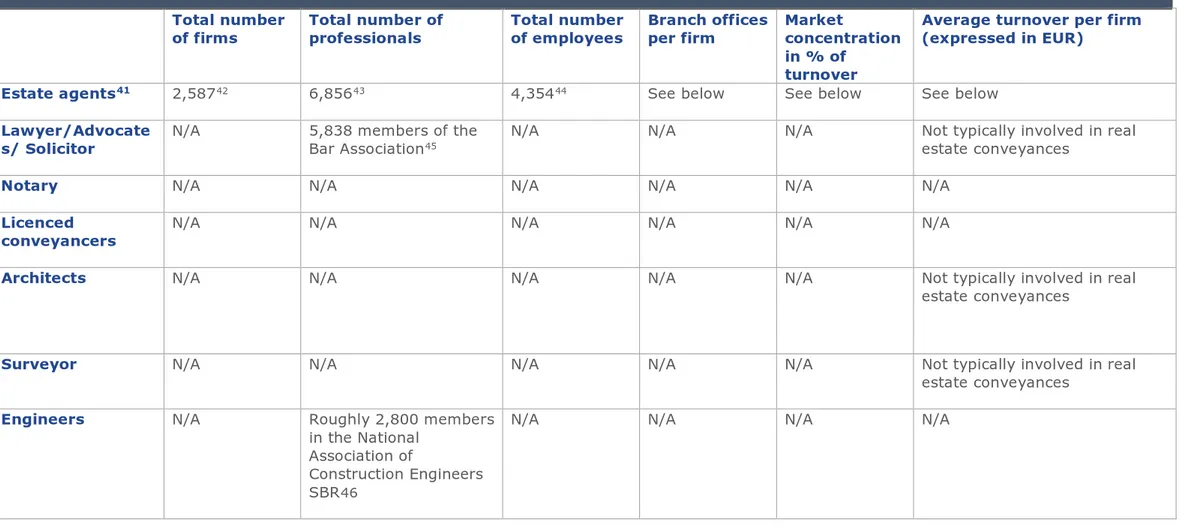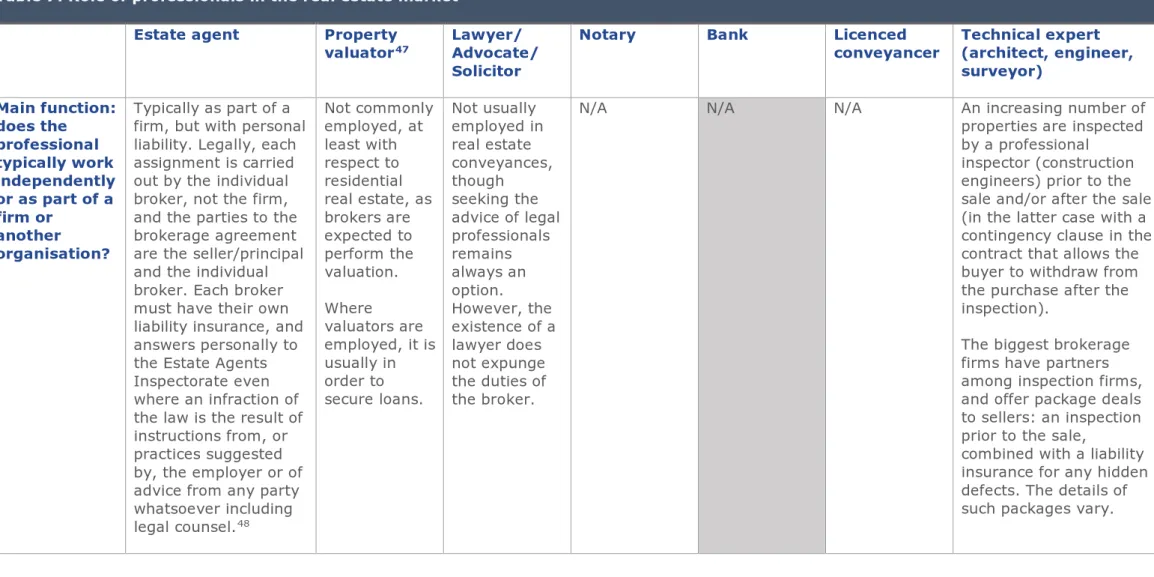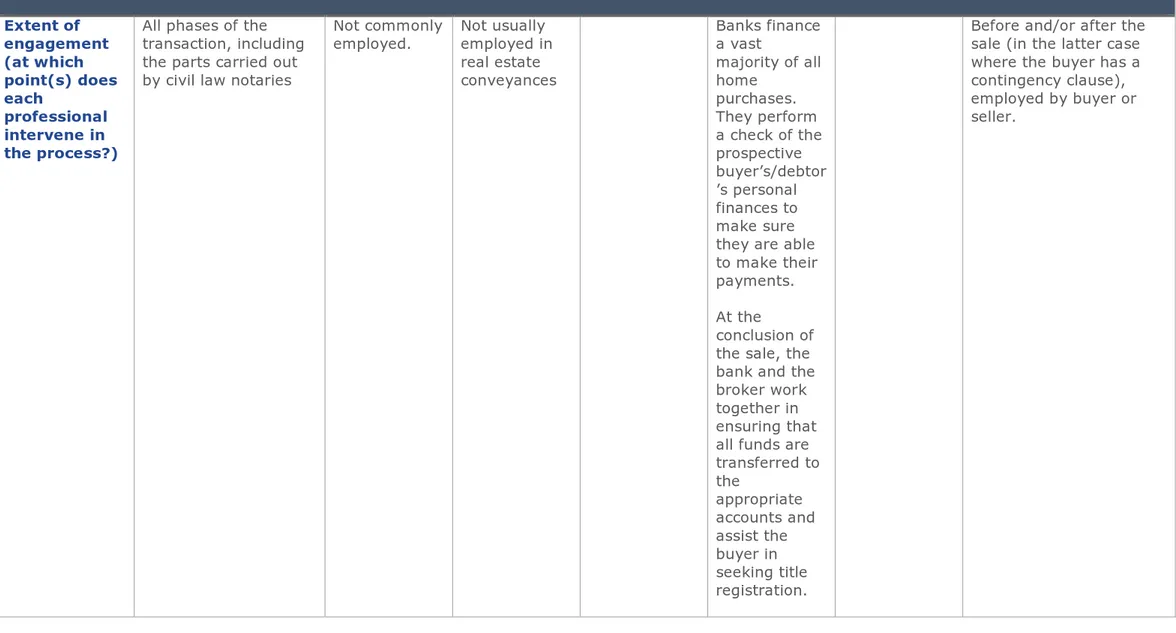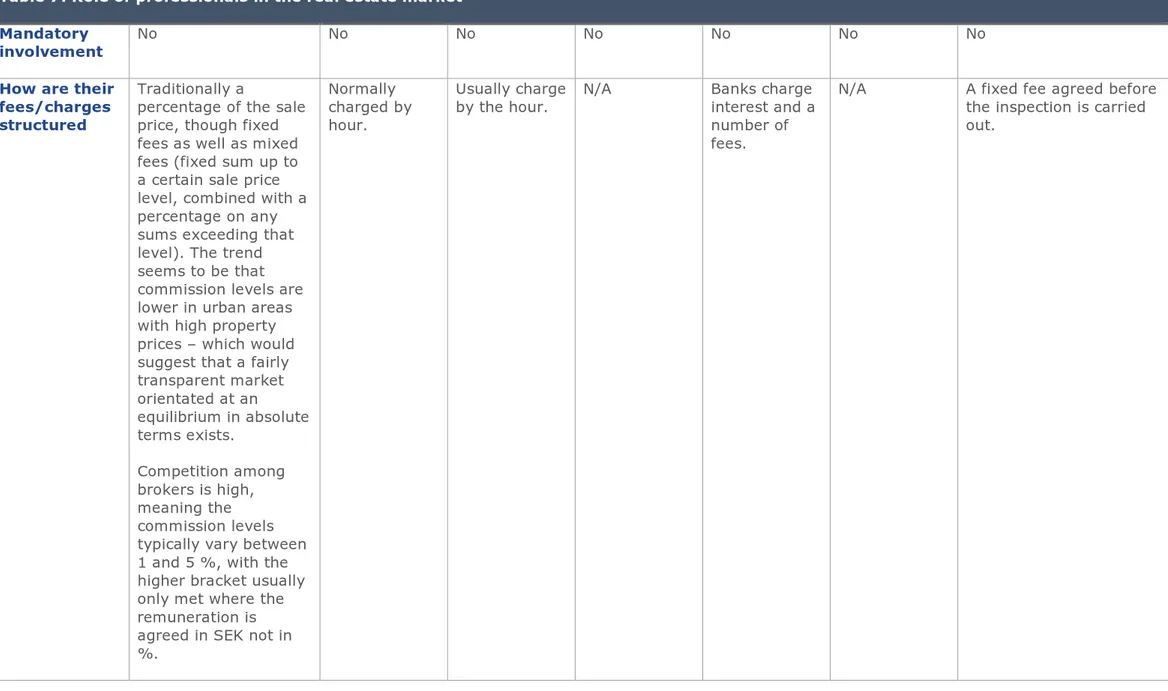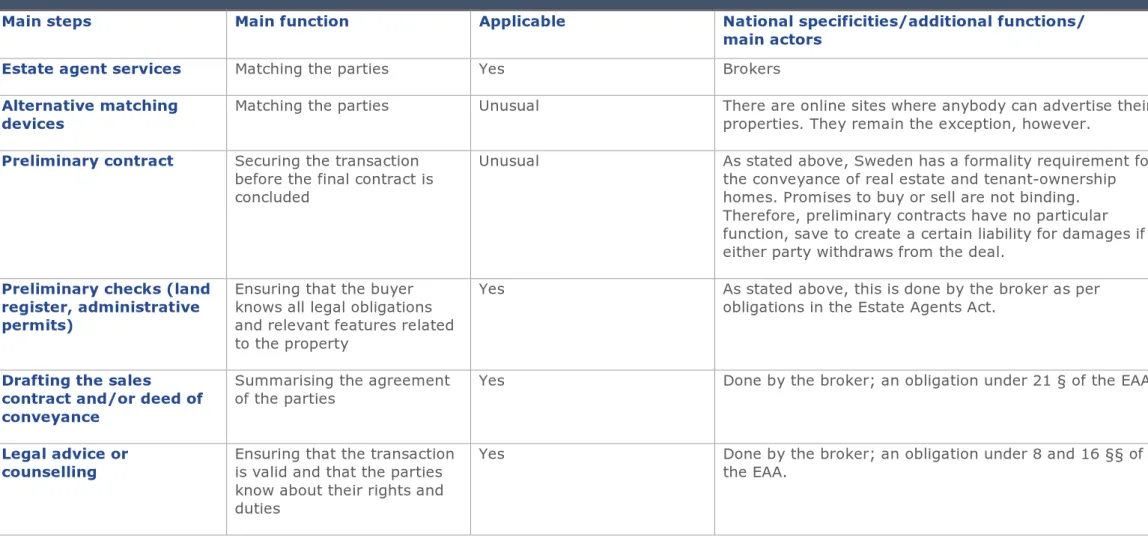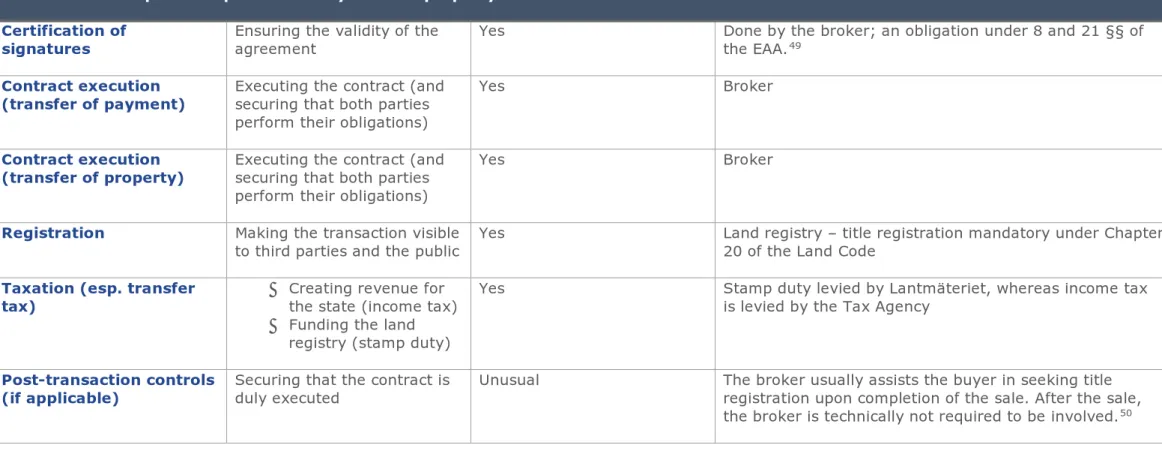Consumer market study on the
functioning of the real estate
services for consumers in the
European Union
Country fiche – SWEDEN
General Information
Country Sweden
Researcher name Ola Jingryd
Researcher contact details (email) ola.jingryd@mah.se
Main Sources Used Legal sources for matters of law, statistical data from Statistics Sweden and
other government agencies as well as industry sources, and government and industry sources for miscellaneous information. See the tables and footnotes throughout the document.
1.
Regulatory background
1.1 Level of regulation in the country
Table 1: Level of regulation
Level of regulation Source of relevant
legislation Ongoing discussion on regulation/deregulation (if applicable): current state of affairs and main arguments in the debate
Real estate
transactions1 • Formal requirements for binding contract (written contract); • Title registration
mandatory
(declaratory; has a number of effects towards third parties).
• 4:1 of the Land Code (1970:994)
• 6:4 of the Tenant-Ownership Act (1991:614)
• Chapter 20 of the Land Code (title registration)
As of yet, electronic signatures are not accepted with respect to real estate and tenant-ownership homes. The contract must therefore be in traditional paper form and both parties must sign the same copy/copies.
Some discussion among academics as to the merits of the requirement of a written contract. It is an exception to the general rules on Swedish contract law. One problem for consumers has been identified: as a result of the formality requirement, bids to buy or sell real estate or tenant-ownership homes are not binding. Consequently, prospective buyers can feel free to bid on properties, helping raise prices, knowing they will not be forced to make good on their bids. This also makes it possible for disloyal parties to lodge fake bids in order to raise the sale price. While there is no solid evidence to suggest that fake bids are in fact commonplace on the real estate and housing market, there is a perception among many that this is so. The behaviour constitutes a criminal act2, and brokers
implicated in such behaviour will lose their professional license.3
To counter the problem of fake bids, several measures are plausible. Since over 90 % of all transactions are conducted through real estate brokers4, one effective measure could be to
raise transparency by amending 20 § of the Estate Agents Act (2011:666). Said provision requires brokers to, inter alia, make
1E.g. limitations or prohibitions of certain transactions; specific formality requirements etc. 2 See the Supreme Court case NJA 2016 s. 39.
3 Melin, Magnus, Fastighetsmäklarlagen. En kommentar, 4th ed. 2017, Wolters Kluwer, p. 66; Jingryd, Ola & Segergren, Lotta, Fastighetsförmedling, 4th ed. 2015, Studentlitteratur, pp. 232-236. 4 Mäklarsamfundet, Fastighetsmäklarbranschen. Fakta & nyckeltal 2016, p. 17, available at
Table 1: Level of regulation
a list of all received bids, with the names and contact details of the bidders, as well as any conditions tied to the bid. Upon completion of the sale, buyers and sellers must each be given a copy of the bidding list. However, the other bidders have no legal right to see the bidding list. One measure that has been suggested is to grant all parties who have participated in the bidding a legal right to see the bidding list.
There are attempts from the industry to make the bidding process more secure. For instance, some brokerage firms have begun requiring that bidders log in with their “Bank ID”, an electronic ID that can be obtained from the banks and that is widely used and recognized as an electronic signature. As of yet no far-reaching discussion proposing the abolition of the formality requirement has materialized. However, the Supreme Court has suggested in an obiter dictum5 that a buyer
or seller in a real estate sale who negligently leads the other party to believe that a contract has been entered into, or that its entering is imminent, could become liable for damages incurred by the misled party. It should be noted, however, that to date no buyer or seller has been held liable under such circumstances except where the parties have previously signed a letter of intent (while promises to buy or sell are not binding with respect to the sale itself, they can give rise to liability for damages).
In sum, with respect to the level of regulation, it seems fair to assert that one may expect more rather than less regulation in the future.
Notary system (or lawyer/conveyancer system)6
Semi-regulated Estate Agents Act (2011:666) Estate Agents Ordinance (2011:668)
There is no mandatory participation of any professional or government agency but the land registry. However, since most conveyances are accomplished through brokers, the regulation
5 NJA 2012 s. 1095.
Table 1: Level of regulation
of brokers is, ipso facto, rendered tantamount to a regulation of the conveyance itself.
Under The EAA, real estate brokers have duties similar to those of civil law notaries7:
• A duty to gather information about the property, such as the lawful owner, any restriction in the right to dispose of the property, easements and other encumbrances, etc.; • A duty to verify the veracity of information provided by
the seller or another party where the information is uncertain or questionable, provided it is not unreasonably cumbersome to do so;
• A duty to disclose relevant information about the property or other matters pertaining to the sale;
• A duty to give counsel on legal, technical, and financial issues pertaining to the sale, particularly with regard to the legal relation between buyer and seller;
• A duty to strive to ensure that the parties enter into agreements on all matters necessary, and to draw up the necessary documents (sale contract, deed, etc.) in a way that is adapted to the transaction at hand and that minimizes the risk of future disputes;
• A duty to ensure that the parties are completely aware of the meaning and legal implications of all parts of the sale contract, including, where applicable, the various
possibilities to regulate sensitive issues in different manners.
It should be noted that brokers are generally required to be informed enough to give such information and advice as may be warranted due to the nature of the transaction, and that the
7 8, 16, 17, 18, 19, 21 §§ of the Estate Agents Act; prop. 1983/84:16, prop. 1994/95:14, prop. 2010/11:15; NJA 1991 s. 625, NJA 1991 s. 725, NJA 1997 s. 127 I & II, NJA 1997 s. 667, RH
1995:127, RH 2000:82, RH 2012:69, RÅ 2006 ref. 53; Jingryd, Ola, Impartial Legal Counsel in Real Estate Transactions: The Swedish Broker and the Latin Notary, doctoral thesis 2012, Royal Institute of Technology (KTH); Melin, op. cit. note 3, pp. 143-188; Jingryd & Segergren, op. cit. note 3, pp. 193-246, 255-310; Melin, Fastighetsmäklarens ansvar för låneklausuler, Juridisk
Table 1: Level of regulation
assumed level of knowledge is usually as high as that of a lawyer. While the travaux préparatoires of the EAA seem to give some measure of freedom for the broker to refrain to give advice on issues where they feel they are not sufficiently proficient8,
the courts have limited the broker’s discretion, requiring advice that often presupposes expert knowledge of the applicable law9.
There is no discourse or debate seeking to abolish this order; on the contrary, it is constantly evolving through the case law of the Estate Agents Inspectorate and the administrative courts, as well as the civil courts.
Profession of estate
agents Strictly regulated Estate Agents Act (2011:666)
Estate Agents Ordinance (2011:668)
The Swedish Consumer Agency recently proposed, in a report10,
the following changes:
• The introduction of a consumer bureau, to be funded by the industry, charged with offering impartial advice to consumers;
• That the Estate Agents Inspectorate, which currently supervises all real estate brokers, is granted supervisory powers over brokerage firms (under the current regime, it is the individual broker who is regulated and thus subject to government oversight);
• That the Estate Agents Inspectorate is granted the right to issue regulations with respect to the obligations and prohibitions in the Estate Agents Act, particularly concerning the obligation to disclose information about the physical condition of the property, on which note the Consumer Agency proposes the information be made mandatory when advertising the property, as opposed to the current regime where information on e.g. physical
8 Prop. 1983/84:16, p. 37.
9 See e.g. NJA 1997 s. 127 I & II, RH 2000:82, RH 2012:69, Svea HovR T 11309-14.
Table 1: Level of regulation
defects need only be disclosed to prospective buyers who have come further in the sale process11;
• That brokers be obliged to inform the public, when advertising a property, of the estimated market value of the property;
• Increased regulation of the bidding process and the broker’s obligations surrounding it; and
• New provisions in the Estate Agents Act to regulate the broker’s duty to provide information when brokering tenant-ownership homes which are under construction. To what extent any of the agency’s proposals will become reality is currently uncertain.
1.2 National legislation
Table 2: List of national legislation
List of national legislation Classification of national
legislation Content of the national legislation
Land Code (1970:994) Land law, private law, real estate law • Definition of real estate and basic provisions, • The use of land and real estate,
• Purchase/sale • Mortgage
• Easements, usufructs and other rights • Priority of rights
• Land registry
Table 2: List of national legislation
Tenant-Ownership Act (1991:614) Land law, private law, real estate law Tenure similar to condominiums. The Act has a few provisions relating to sale and purchase, but is otherwise concerned with the tenant-ownership association and its relation to its members.
Estate Agents Act (2011:666) Consumer protection; regulation of
professions • Licensing system including mandatory registration at the Estate Agents Inspectorate (5 §), and a criminal provision (31 §) prohibiting the practice of real estate brokerage without a license/registration.
• Mandatory university education of 120 ECTS including, inter alia, 30 ECTS real estate law and private law, 30 ECTS real estate brokerage (which also includes law), 7.5 ECTS tax law, 7.5 ECTS construction engineering, 7.5 ECTS property valuation, and 15 ECTS economics and/or business administration12
• A general duty to exercise due care, to safeguard the interests of both buyer and seller, and to act in accordance with “sound estate agency practice” in all things (8 §)
• A duty of impartiality and independence, including prohibitions to purchase the property one has been assigned to convey, to cater to relatives and parties with whom the broker has shared economic interests, to engage in activities – or broker in situations – where the impartiality and integrity of the broker may be called into question, and to act as an attorney on behalf of one of the parties in relation to the other (11-15 §§)13
• A duty to gather and disclose information, to give advice and to draw up the necessary legal documents, as described above (8, 16-19, 21 §§)
• A duty to make notes of what transpires through the brokerage process, particularly the execution of the broker’s legal obligation (20 §)
12 See KAMFS 2013:3.
13 Due to the latter prohibition, laid down in 15 § EAA, it is arguably not entirely accurate to call real estate agents in Sweden “agents” at all, since they are in fact forbidden from representing
Table 2: List of national legislation
• A duty to draw up a bidding list and present the buyer and seller with a copy each upon completion of the sale –or to the seller, if the assignment ends without the property being sold (20 §) • The broker’s right to remuneration (23-24 §§)
• The broker’s civil liability (25-26 §§)
• The broker’s disciplinary responsibility (29 §)
Sales Act (1990:931) Buyer and seller Governs the contractual relation between buyer and seller in sales concerning all other kinds of property than real estate; in the housing market, this applies primarily to tenant-ownership homes and
condominiums.
The rules are similar, but not identical, to those in the Land Code. There is, from time to time, discussion on whether all types of homes should be governed by identical rules. As of yet, this is not the case.
Income Tax Act (1999:1229) Tax law See below
Stamp Duty Act (1984:404) Tax law See below
Act (1979:230) on the Acquisition
of Rural Land Buyer (affects seller) The main aspect of the statute is the requirement for the buyer of rural land, in some instances, to obtain an acquisition permit. Act (2011:914) on Consumer
Protection With Respect to Timeshare or Long-Term Holiday Products
Buyer, seller Implements Directive 2008/122/EC on the protection of consumers, in respect of certain aspects of timeshare, long-term holiday product, resale and exchange contracts
The above-mentioned statutes are the principal applicable statutes. There are more statutes that are potentially applicable in some instances of real estate conveyances.
1.3 Implementation of relevant EU legislation
Table 3: Implementation of relevant EU legislation
EU legislation Implementation
achieved? Implementation of EU legislation at the national level (e.g. the name of the law)
Source of the national implementation legislation Content of the national legislation in keywords
Which parts of the EU legislation have not been transposed?
Directive
2005/29/EC on unfair commercial practices (UCPD)
Yes Marketing Act
(2008:486). Prop. 2007/08:115; bet. 2007/08:CU21 Prop. 2015/16:46, bet. 2015/16:CU11 Marketing law,
consumer law All parts should be transposed.To implement the Directive, Sweden abolished its old Marketing Act in 2008 and replaced it by the current statute. In September 2014, the Commission let the Swedish government know that it did not deem the Swedish implementation complete on the issue of aggressive marketing. As a result,
legislation was enacted in 2015, whereby a new provision (7 a §) was introduced.14 Directive 93/13/EEC on unfair terms in consumer contracts Yes Lag (1994:152) om avtalsvillkor i konsumentförhållanden Prop. 1994/95:17; bet. 1994/95:LU5 Consumer law, marketing law, private law None 14 Prop. 2015/16:46, p. 5.
Table 3: Implementation of relevant EU legislation Directive 2008/122/EC on the protection of consumers, in respect of certain aspects of timeshare, long-term holiday product, resale and exchange contracts Yes Act (2011:914) on consumer protection in respect of timeshare or long-term holiday product Amendments made to • Distans- och hemförsäljningslagen (2005:59) • Lag (2006:595) om europakooperativ • Marketing Act (2008:486) Prop. 2010/11:85; bet. 2010/11:CU55 Consumer law,
private law None
Directive 2010/31/EU of Energy Performance of Buildings Directive Yes Amendments to • Lag (2006:985) om energideklarationer • Förordning (2006:1592) om energideklarationer Prop. 2011/12:120; bet. 2011/12:CU26 Environment law, construction law, real estate law None Directive 2005/36/EC on Recognition of Professional Qualifications, as last amended by Directive 2013/55/EU Yes Recognition of Professional Qualifications Act (2016:145) Recognition of Professional Qualifications Ordinance (2016:157) Prop. 2015/16:44; bet. 2015/15:UbU6 Real estate brokerage law, labour law None
Table 3: Implementation of relevant EU legislation Mortgage Credit Directive, 2014/17/EC Yes Lag (2016:1024) om verksamhet med bostadskrediter Amendments to • Kreditupplysningslag en (1973:1173) • Lag (1992:160) om utländska filialer mm. • Lag (1996:1006) om anmälningsplikt avseende viss finansiell verksamhet • Lag (2005:59) om distansavtal och avtal utanför affärslokaler • Money Laundering Act (2009:62) • Offentlighets- och sekretesslagen (2009:400) • Konsumentkreditlage n (2010:1846) • Lag (2014:275) om
viss verksamhet med konsumentkrediter
Prop.
2015/16:197; bet. 2015/17:CU5
Consumer law,
1.4
Communications and strategy papers
Table 4: Communications and strategy papers
Communication or
strategy paper Have the following communications and strategy papers been referred to in national documents?
Name of document Source Content Differences with respect to
communications and strategy papers listed in the first column COM(2015) 550 final
Communication of the Commission Upgrading the Single Market: more opportunities for people and business
Yes Consumer Agency
Consideration 2015/149115 Swedish Competition Authority Statement 742/201516 Tax Agency Statement 131 623462-15/11217
There have also been statement from non-government bodies, and there may be more documents referring to the paper.
See footnotes Discussion of European policy initiatives in the Swedish context
None
COM(2013)676
Communication from the Commission on
evaluating national
Yes Government Fact
Memo
2013/14:FPM1818
See footnotes Ditto None
15 http://www.konsumentverket.se/om-konsumentverket/vara-remissyttranden/2016/remiss-kom2015-550-slutlig-att-forbattra-den-inre-marknaden-battre-mojligheter-for-individer-och-foretag/ (2016-06-26). 16 http://www.konkurrensverket.se/globalassets/aktuellt/nyheter/15-0742-yttrande-inre-marknadsstrategi.pdf (2016-06-26). 17 https://www.skatteverket.se/omoss/omskatteverket/rapporterremissvarochskrivelser/remissvar/2015/remissvar2015/13162346215112.5.3810a01c150939e893f148bf.html (2016-06-22). 18 http://www.riksdagen.se/sv/Dokument-Lagar/?doktyp=eundok,fpm&riksmote=2007/08,2013/14&sort=rel&sortorder=desc (2016-06-26).
Table 4: Communications and strategy papers
regulations on access to
professions SOU 2014:19 Official Investigation Report on the National Implementation of the Professional Qualifications Directive19 COM(2016)820
Communication from the Commission on reform recommendations for regulation in
professional services
Yes Government Request
for Consideration Statements
U2017/00304/UH20
See footnote Ditto None
European Consumer
Agenda Yes Government Fact Memo 2011/12:FPM16021
See footnote Ditto None
Consumer Programme
2014-2020 Yes Government Fact Memo 2011/12:FPM6722
See footnote Ditto None
19 http://www.regeringen.se/rattsdokument/statens-offentliga-utredningar/2014/04/sou-201419/ (2016-06-26). 20 http://www.regeringen.se/remisser/2017/01/remiss-av-forslag-till-europaparlamentets-och-radets-direktiv-om-proportionalitetsprovning-fore-antagandet-av-ny-reglering-av-yrken-kom-2016-822-slutlig-m.m/ (2016-06-26). 21 http://www.riksdagen.se/sv/dokument-lagar/dokument/fakta-pm-om-eu-forslag/strategi-for-konsumentpolitiken-i-eu_GZ06FPM160 (2016-06-26). 22 http://www.riksdagen.se/sv/dokument-lagar/dokument/fakta-pm-om-eu-forslag/eus-konsumentprogram-2014---2020_GZ06FPM67 (2016-06-26).
2.
General market information
2.1 Key market data
Table 5: Key market data
General market situation (e.g. trends in the market, recent
developments in the market, price fluctuations, etc.)
• Severe housing shortage. The Housing Agency estimates that more than 700,000 new homes are needed within the next 10 years.23
• Urbanization and immigration. The pressure on most municipalities, particularly the three biggest
cities Stockholm, Gothenburg, and Malmö, is further increasing. The problem is accentuated by the large recent influx of asylum seekers, in combination with a legal right24 for asylum seekers to refuse a
dwelling offered by the state if they can arrange housing on their own. Typically, this leads to
clustering. It mostly affects the rental market, although because the municipalities are charged with providing housing to all inhabitants25, and since recently they are also obliged by law to accept all
asylum seekers assigned to them by the national government26, some municipalities have taken to
going out of the market and purchasing tenant-ownership homes, and in some instances properties, in order to fulfil their obligations.27
• Mortgage caps, mandatory amortization and less advantageous income tax deductions hamper supply. Based on a recommendation from the Financial Markets Inspectorate28, banks are currently not granting mortgages higher than 85 % of the property’s value. The Inspectorate has also issued a regulation requiring lenders to require amortization down to 70 % of the property’s value.29 Combined
with capital gains tax and the high and rising market prices, many people refrain from putting their home on the market. This limits short-term supply, which in turn serves to increase market prices. • Soaring prices. According to recent statistics30, prices are up from May 2016 to May 2017 by 7 % for
tenant-ownership homes, 9 % for houses, and 9 % for holiday homes. While Stockholm remains by far the city with the highest market prices, the last year’s rise has been higher in Gothenburg and Malmö.
• Mandatory amortization (meaning that in a loan contract, the monthly instalments to be paid by the debtor to the lender must not only cover the interests but also repay the loan): Mandatory
23 Boverket rapport 2016:18, Reviderad prognos över behovet av nya bostäder till 2015, available at
http://www.boverket.se/globalassets/publikationer/dokument/2016/reviderad-prognos-over-behovet-av-nya-bostader-till-2025.pdf (2017-06-22).
24 Asylum Applicant Act (1994:137).
25 Municipal Housing Provision Act (2000:1383).
26 Provision of Housing to Recently Arrived Immigrants Act (2016:38).
27 2:4 p. 2 of the Tenant-Ownership Act provides that a municipality that has purchased a tenant-ownership home cannot be refused membership in the tenant-ownership association that owns
the property.
28 FFFS 2016:33, available at http://www.fi.se/contentassets/79f5f2bb456541e398d473bd5a58be60/fs1633.pdf (2017-06-22). 29 FFFS 2016:16, available at http://www.fi.se/contentassets/690c9d8430bd4961b6073dedf4f9105f/fs1616.pdf (2017-06-22).
Table 5: Key market data
amortization is intended to curb the mortgage levels. In the short run, however, it seems it contributes to a low supply, which generates higher prices.
• Debate on market developments. The idea has been floated to cool the market by removing the income tax reduction for mortgage interest payments. Under the current regime, the tax reduction is 30 % of all interest payments.31 As of yet, no government has presented such a proposition to
Parliament.
Total value of residential
transactions for buying and renting for the year 2015 (2014 or 2013 depending on the latest available data) expressed in EUR
Total value of conveyances of owner-occupied dwellings – houses, tenant-ownership homes and holiday homes – in 2015 was roughly € 39,000,000,000 (SEK 381,000,000,000).32 No figures are available on
renting.
Ratio house owners – tenants (i.e. the percentage of households that are owners resp. tenants of dwelling units)
Roughly 61 % of all homes are owner-occupied (houses or tenant-ownership homes; see Table 1.2); the rest are rentals.33
Usage of land (Quotas for built land, agricultural land, “wild land”
(forests, lakes etc.)
In 2010, according to Statistics Sweden34
• 2,8 % built land • 69 % forests
• 8 % agricultural land • 9 % mire/peatland • 8 % natural grass land
• 0,1 % golf courses and skiing pistes • 0,1 % quarries and mining areas • 3 % mountains and miscellaneous land
31 Chapters 42 and 65 of the Income Tax Act; technically, the whole sum is deducted, but with a 30 % capital gains tax rate, the effect is a tax reduction. 32 Mäklarsamfundet, op. cit. note 4, p. 16.
33 Ibid., p. 13.
34 https://www.scb.se/sv_/Hitta-statistik/Statistik-efter-amne/Miljo/Markanvandning/Markanvandningen-i-Sverige/12850/12857/Behallare-for-Press/Markanvandningen-i-Sverige-2005-367523/
Table 5: Key market data
Average prices of residential
property According to the type of property • • Data retrieved from available information: Average Prices Sweden35
• Tenant-ownership homes € 4,112/m2 36
• Houses (all sizes) € 334,720
• Holiday homes (all sizes) € 164,196 According to the type of
location Data retrieved from available information:
Tenant-ownership homes37 • Central Stockholm € 9,643/m2 • Greater Stockholm € 6,126/m2 • Central Gothenburg € 6,365/m2 • Greater Gothenburg € 4,578/m2 • Central Malmö € 3,188/m2 • Greater Malmö € 2,954/m2 Houses • All Sweden € 334,720 • Greater Stockholm € 623,937 • Greater Gothenburg € 472,872 • Greater Malmö € 394,470
Price development of residential
property According to the type of property Data retrieved from available information: All Sweden38 • Tenant-ownership homes + 7% • Houses + 9% • Holiday homes + 9% 35 https://www.maklarstatistik.se/pressmeddelanden/okande-villapriser-men-nagot-lugnare-utveckling-bland-bostadsratter/ (2017-06-27). 36 It has become increasingly common to measure the price of tenant-ownership homes by the price per square meter.
37 Op. cit. note 36. 38 Ibid.
Table 5: Key market data
According to the type of
location • Data retrieved from available information:
Tenant-ownership homes March-May 2017 compared to March-May 201639
• Central Stockholm + 6 % • Greater Stockholm + 6 % • Central Gothenburg + 10 % • Greater Gothenburg + 11 % • Central Malmö + 16 % • Greater Malmö + 18 %
Houses March-May 2017 compared to March-May 2016 • All Sweden + 9 %
• Greater Stockholm + 5 % • Greater Gothenburg + 11 % • Greater Malmö + 10 %
Development of price index (Housing price index if existing, otherwise Consumer price index)
Consumer price index for housing rose by 2.2 % between October 2015 and October 2016.40
39 Ibid.
40 Statistics Sweden,
2.2 Service providers
Table 6: Service providers
Total number
of firms Total number of professionals Total number of employees Branch offices per firm Market concentration in % of
turnover
Average turnover per firm (expressed in EUR)
Estate agents41 2,58742 6,85643 4,35444 See below See below See below
Lawyer/Advocate
s/ Solicitor N/A 5,838 members of the Bar Association45 N/A N/A N/A Not typically involved in real estate conveyances
Notary N/A N/A N/A N/A N/A N/A
Licenced
conveyancers N/A N/A N/A N/A N/A N/A
Architects N/A N/A N/A N/A N/A Not typically involved in real estate conveyances
Surveyor N/A N/A N/A N/A N/A Not typically involved in real estate conveyances
Engineers N/A Roughly 2,800 members in the National
Association of
Construction Engineers SBR46
N/A N/A N/A N/A
41 Where available data provided separately for national real estate agents and real estate agents incoming from other EU/EEA Member States. 42 Firms with at least one employee; see https://www.scb.se/sv_/Vara-tjanster/Foretagsregistret/Aktuell-statistik-ur-Foretagsregistret/ (2016-06-26). 43 As of May 31st, 2017; Estate Agents Inspectorate, http://www.fmi.se/Sve/Filer/Statistik%202017-05-31.pdf (2016-06-26).
44 Rough figure, the total number of brokers (6,856) minus the number of brokerage firms with no employees (2,502); for the latter number, see the link in note 37. 45 Advokatsamfundet, https://www.advokatsamfundet.se/Pressrum/Fakta-om-Advokatsamfundet/#antal (2016-06-26).
Of the abovementioned professionals, only real estate brokers and construction engineers are typically involved in real estate conveyances. Financial information concerning employees, turnover, etc. for the other professions is therefore of limited interest.
Statistics concerning the number of firms, employees and turnover for the real estate brokerage industry have proven difficult to obtain. The industry is dominated by up to 10 brokerage firms, which operate under the franchise model. Each franchisee is both an employer and a franchisee, and both a business owner and a part of a big firm.
3. Roles of professionals and services in the real estate market
Table 7: Role of professionals in the real estate market
Estate agent Property
valuator47 Lawyer/ Advocate/
Solicitor
Notary Bank Licenced
conveyancer Technical expert (architect, engineer, surveyor) Main function: does the professional typically work independently or as part of a firm or another organisation? Typically as part of a firm, but with personal liability. Legally, each assignment is carried out by the individual broker, not the firm, and the parties to the brokerage agreement are the seller/principal and the individual broker. Each broker must have their own liability insurance, and answers personally to the Estate Agents Inspectorate even where an infraction of the law is the result of instructions from, or practices suggested by, the employer or of advice from any party whatsoever including legal counsel.48 Not commonly employed, at least with respect to residential real estate, as brokers are expected to perform the valuation. Where valuators are employed, it is usually in order to secure loans. Not usually employed in real estate conveyances, though seeking the advice of legal professionals remains always an option. However, the existence of a lawyer does not expunge the duties of the broker.
N/A N/A N/A An increasing number of
properties are inspected by a professional
inspector (construction engineers) prior to the sale and/or after the sale (in the latter case with a contingency clause in the contract that allows the buyer to withdraw from the purchase after the inspection).
The biggest brokerage firms have partners among inspection firms, and offer package deals to sellers: an inspection prior to the sale,
combined with a liability insurance for any hidden defects. The details of such packages vary.
47 In some EU countries, the real estate property valuators are regulated as a profession that is separate from estate agents (e.g. Hungary, Lithuania, Latvia); their services might be obligatory,
especially when taking mortgage loans.
48 In RÅ 2002 ref. 30, the broker was acquitted by the Supreme Administrative Court for acting on the advice of counsel. Said advice was highly questionable in substance, and two out of the
five members of the court issued a dissenting opinion. The case is widely considered to be of limited value as a precedent and courts do not see themselves as bound by it; see e.g.
Table 7: Role of professionals in the real estate market Extent of engagement (at which point(s) does each professional intervene in the process?)
All phases of the transaction, including the parts carried out by civil law notaries
Not commonly
employed. Not usually employed in real estate conveyances Banks finance a vast majority of all home purchases. They perform a check of the prospective buyer’s/debtor ’s personal finances to make sure they are able to make their payments. At the
conclusion of the sale, the bank and the broker work together in ensuring that all funds are transferred to the appropriate accounts and assist the buyer in seeking title registration.
Before and/or after the sale (in the latter case where the buyer has a contingency clause), employed by buyer or seller.
Appeal of Stockholm) stated that the 2002 Supreme Administrative Court case could not be deemed to mean that an act or omission is not in breach of the law simply because it is preceded by advice from counsel.
Table 7: Role of professionals in the real estate market
Mandatory
involvement No No No No No No No How are their
fees/charges structured
Traditionally a
percentage of the sale price, though fixed fees as well as mixed fees (fixed sum up to a certain sale price level, combined with a percentage on any sums exceeding that level). The trend seems to be that commission levels are lower in urban areas with high property prices – which would suggest that a fairly transparent market orientated at an equilibrium in absolute terms exists. Competition among brokers is high, meaning the commission levels typically vary between 1 and 5 %, with the higher bracket usually only met where the remuneration is agreed in SEK not in %.
Normally charged by hour.
Usually charge
by the hour. N/A Banks charge interest and a number of fees.
N/A A fixed fee agreed before the inspection is carried out.
4. Land registration
Table 8: Land registration
Responsible authority(ies)
dealing with land registration Lantmäteriet (national survey agency) Actors involved in the registration
procedure and their main functions
Lantmäteriet – Land registry department
Intermediate steps of the registration procedure, if applicable
5.
The process to buy or sell a property
5.1 Main steps in the transaction process to buy or sell a property
Table 9: Main steps of the process to buy or sell a property
Main steps Main function Applicable National specificities/additional functions/ main actors
Estate agent services Matching the parties Yes Brokers
Alternative matching
devices Matching the parties Unusual There are online sites where anybody can advertise their properties. They remain the exception, however.
Preliminary contract Securing the transaction before the final contract is concluded
Unusual As stated above, Sweden has a formality requirement for the conveyance of real estate and tenant-ownership homes. Promises to buy or sell are not binding. Therefore, preliminary contracts have no particular function, save to create a certain liability for damages if either party withdraws from the deal.
Preliminary checks (land register, administrative permits)
Ensuring that the buyer knows all legal obligations and relevant features related to the property
Yes As stated above, this is done by the broker as per obligations in the Estate Agents Act.
Drafting the sales
contract and/or deed of conveyance
Summarising the agreement
of the parties Yes Done by the broker; an obligation under 21 § of the EAA.
Legal advice or
counselling Ensuring that the transaction is valid and that the parties know about their rights and duties
Yes Done by the broker; an obligation under 8 and 16 §§ of the EAA.
Table 9: Main steps of the process to buy or sell a property
Certification of
signatures Ensuring the validity of the agreement Yes Done by the broker; an obligation under 8 and 21 §§ of the EAA.49
Contract execution
(transfer of payment) Executing the contract (and securing that both parties perform their obligations)
Yes Broker
Contract execution
(transfer of property) Executing the contract (and securing that both parties perform their obligations)
Yes Broker
Registration Making the transaction visible
to third parties and the public Yes Land registry – title registration mandatory under Chapter 20 of the Land Code
Taxation (esp. transfer
tax) • Creating revenue for the state (income tax) • Funding the land
registry (stamp duty)
Yes Stamp duty levied by Lantmäteriet, whereas income tax is levied by the Tax Agency
Post-transaction controls
(if applicable) Securing that the contract is duly executed Unusual The broker usually assists the buyer in seeking title registration upon completion of the sale. After the sale, the broker is technically not required to be involved.50
49 The broker has perfect incentive to make sure this is done, as their right to remuneration typically hinges on a valid and binding sale agreement; see 23 § EAA. 50 In fact, they are often discouraged from being involved due to the risk of violating the impartiality rule in 8 § EAA; see Melin, op. cit note 3, p. 85-87.
5.2 Sale contract and transfer of ownership
Table 10: Contract of sale and transfer of ownership
Main steps Actors involved per
intermediate step Payment details
51 Typical risks associated to these
steps, if relevant Payments expressed :
• In EUR as % of total purchase price and
• As a fixed amount if available (add if VAT applies)
When is the payment made
Estate agent services or alternative matching devices
Broker (usual) The broker’s fee is one fee, which applies to all tasks carried out. The market is free, and in large parts of the country, competition is fierce. Remuneration levels reflect the level of competition.
Commission levels vary between 1 and 5 %, with 2-4 % being most common.
In consumer relations, all fees include VAT.
Once the sale contract is definitely binding, i.e. when it is signed by both parties and when any contingency clauses have lapsed (or the conditions are met)
51 Payment shall be considered as the ‘discharge of an obligation by its settlement equal to the monetary value of the debtor’s obligation’ while fees can be defined as ‘a charge for services
rendered’ (Retrieved from: http://www.investorwords.com/3634/payment.html, http://www.investorwords.com/1922/fee.html). Payment, therefore, includes both the cost of the service and the fees for the service in question.
Table 10: Contract of sale and transfer of ownership
Preliminary contract
(usual) As previously stated, a preliminary contract, can never be binding save to create a certain liability for a withdrawing party. Therefore, such contracts are rare.
Preliminary checks (land register, administrative permits)
Broker (usual) If there are voluntary easements or
other encumbrances, which have not been submitted to the land registry (but nonetheless binding), the broker may not find them. It is usual in standard contracts for seller to guarantee that by the date of possession, there will be no
encumbrances save those, which have been previously disclosed. However, at times this promise is hollow.
Drafting the sales contract and/or deed of
conveyance
Broker (usual) While brokers are individually liable
for malpractice, and while they are required to adapt the contract to the transaction at hand, brokers are frequently employees of national franchise firms. These firms have pre-made standard contract clauses. The broker may face pressure to improve profits by minimizing the time spent on each transaction, which increases the risk that the contract does not reflect the will and needs of the parties.
The same risk is exacerbated when brokers do not provide the parties with draft contracts before signing. In
Table 10: Contract of sale and transfer of ownership
such situations, it may be difficult for consumers to understand the contract – although it is common practice and arguably mandatory for the broker to read the contract out loud with buyer and seller present – and know what to react to.
Legal advice or
counselling Broker (usual) Since the broker’s right to remuneration is tied to the completion of the sale (23 § EAA), but not the completion of all his/her duties, the broker arguably has insufficient incentives to spend time on advice.52
Certification of signatures Broker (usual) -
Contract execution
(transfer of payment and registration; transfer of property)
Broker (usual) -
Registration in land
register or similar device Land registry (Lantmäteriet) € 85
53 for title
registration
€ 39 per mortgage deed
-
Taxation (esp. transfer
tax) Lantmäteriet (stamp duty)
Tax Agency (capital gains tax)
1,5 % of the sale price (4,25 % for commercial actors). Capital gains 22 % for homes, and 27% for commercial
properties
Stamp duty, when seeking title registration Capital gains, the year after the sale takes place
-
52 See
Information on the legal position of a tenant occupying the dwelling to be sold. In particular: Does the rule emptio non tollit locatum apply?
This is governed by Chapter 7 of the Land Code (LC). 7:11 requires the seller to notify the buyer of any encumbrances, including tenants. Upon notification, the rights are binding towards the buyer. If the seller fails to inform, 7:13 provides that tenancies are nonetheless binding towards the buyer if the tenancy contracts have been entered into in writing (which the tenant is entitled under 12:2 LC to demand), and the tenants have taken possession prior to the sale. The tenancy is also binding towards the buyer if the buyer was aware, or should have been aware, of the tenancy prior to the sale (7:14).
5.3 Professional services performed in the real estate market related to buying and selling a property
Table 11: Professional services performed in the real estate market related to buying and selling a property
Services in the real estate market
Minimum standards for information provided by law,
if applicable Service providers involved Quality of involvement Fees expressed: • In EUR as % of total purchase price and • As a fixed amount (if available) Estate agent services or alternative matching devices
The EAA does not contain any provisions requiring brokers to provide information about their own service. However, brokerage services are also governed by the Marketing Act (2008:486) which contains general and more specific prohibitions against misleading marketing.
One important non-regulated piece of information is the role of the broker in the transaction. The absence of such
information is typically detrimental to the broker, since 8 § EAA requires the broker to act impartially in relation to buyer and seller, which sometimes causes dissatisfaction among some clients, particularly sellers. Thus, the broker has incentive to inform the parties of the role, which the law dictates for him/her.
Broker Explained two
columns to the left Covered by the broker’s commission (see Table 10)
Provision of mandatory information before the start of the
transaction, if applicable
18 § EAA – The broker must provide a prospective buyer who is a consumer with a description of the property (which, since the obligation applies in relation to all prospective buyers, is typically provided at showings or, prior to that, in connection with the advertisement online), which must specify:
• The name, taxable value, area and operating costs of the property;
• Any mortgages, easements, or other encumbrances; • Any joint facilities; and
• The age, size and construction type of the building.
Broker Mandatory Covered by the
broker’s commission (see Table 10)
Table 11: Professional services performed in the real estate market related to buying and selling a property
Preliminary
contract (usual) N/A - N/A N/A Preliminary
checks (land register, administrative permits)
• 17 § EAA obliges the broker to verify the owner and their right to dispose of the property;
• The existence of any mortgages, easements or other encumbrances; and
• The existence of any joint facilities.
Broker Mandatory Covered by the
broker’s commission
Drafting the sales contract and/or deed of conveyance
21 § EAA – The broker must strive to ensure that the parties enter into agreement with regard to all pertinent issues, and draw up all the necessary documents.54 The
contract and other documents must be adapted to the individual transaction (not merely standard contracts) in a suitable manner. The broker faces civil liability as well as disciplinary sanctions by the Estate Agents Inspectorate for violations.
Broker Mandatory Covered by the
broker’s commission
54 The obligation to draw up the sale contract can be contracted out, but this option is rarely if ever used. Firstly, since the broker is bound by 8 § EAA to safeguard the interests of both buyer
and seller, an agreement to contract out the obligation would have to be made with both parties. It should also be borne in mind that the principal (almost always the seller) pays 100 % of the broker’s commission. Therefore, contracting out the drawing up of the sale contract in exchange for a lower fee is not a viable option. Secondly, 23 § EAA ties the broker’s right to commission to the existence of a binding sale contract. Thus, the broker has an incentive to retain control of the transaction process and ensure that a binding contract is entered into.
Table 11: Professional services performed in the real estate market related to buying and selling a property
Legal advice or
counselling 16 § EAA – the broker must give the parties such information and advice as they may need concerning the property and other issues pertaining to the transaction. This entails giving advice on legal, financial and technical issues. 16 § p. 2 obliges the broker to strive to ensure that the seller provides pertinent information about the property. The same paragraph also requires the broker to inform the buyer in writing about his/her duty to inspect the
property55, and to strive to ensure that the buyer inspects the property prior to the sale.
The duty to counsel is mainly focused on ensuring that buyer and seller are made aware of their respective rights and obligations, and the risks inherent in the type of transaction they are about to undertake.56 This means the
broker must be competent about the laws and regulations that are applicable to the type of property and transaction at hand. Thus, for instance, where the property is a rural property governed by particular statutes that do not concern urban homes, it is incumbent on the broker to know the applicable law and advise the parties accordingly. Tax law is treated differently from other fields of law in that giving tax advice, as opposed to advice on other legal issues, is voluntary for the broker.57
Broker Mandatory, with the exception of tax advice, which is optional but usual.58
Covered by the broker’s commission
55 A “duty to inspect”, while being the established term, is actually misleading. The buyer has no duty to inspect, and faces no liability or other consequences for refraining to do so. However,
pursuant to 4:19 p. 2 of the Land Code, the seller’s liability for defects does not extend to such defects as could have been discovered at an inspection of such thoroughness as is warranted in the individual case (due to numerous factors). The distinction is made between “concealed” defects, for which the seller is liable, and “discoverable” defects, for which the seller is not liable. Thus, the “duty to inspect” is in reality an allocation of risk.
56 It also applies to risks that are particular to the individual transaction.
57 Prop. 1983/84:16, p. 37; NJA 1991 s. 625, NJA 1997 s. 127 I & II, RH 2000:82, RH 2012:69, Svea Court of Appeals T 10086-10, Svea Court of Appeals T 11309-14, RÅ 2006 ref. 53; Melin,
op. cit note 3, pp. 143-160, Jingryd, op. cit note 6, pp. 196-217; Jingryd & Segergren, op. cit. note 3, pp. 255-286.
58 In a survey conducted in 2010, 25 % of the respondents claimed to answer and/or address income (typically capital gains) tax issues in more than 90 % of all conveyances, and another 29 %
answered that this happens in 61-90 % of all conveyances. Thus, it appears safe to conclude that a majority of brokers do in fact give tax advice, and that this can be described as common or usual; see Jingryd, op. cit. note 7, p. 50.
Table 11: Professional services performed in the real estate market related to buying and selling a property
Certification of
signatures 8 § and 21 § EAA: it is incumbent on the broker to ensure the validity and efficacy of the contract. In addition, the Money Laundering Prevention Act (2009:62) obliges, inter alia, brokers to verify the identity of parties with whom they enter into business relations or single transactions worth € 15,000 or more.
Broker Mandatory Covered by the
broker’s commission Contract execution (transfer of payment; transfer of property)
8 § EAA: the validity and efficacy of the broker. While there are no explicit provisions obliging the broker to perform these tasks, it is common practice that brokers do so. It is likely that brokers perceive these tasks to be either
mandatory or an intrinsic part of brokerage.
Broker Optional but (very)
usual Covered by the broker’s commission
Registration in land register or similar device
• Chapter 20 of the Land Code requires the buyer to file for title registration within 3 months of the purchase (20:1-2).
• Stamp duty under the Stamp Duty Act (1984:404)
The broker or bank usually assists the buyer with this.
Optional but (very)
usual • Broker’s services covered by commission • 1,5 % of the
sale price (or, if the sale price is lower than the taxable value, the taxable value) Taxation (esp.
transfer tax) Capital gains tax under the Income Tax Act (1999:1229) No assistance, although tax advice given by the broker is not uncommon
Optional but usual Remuneration for tax advice from broker not necessarily covered by commission. The broker is free to charge any remuneration, as it is a free market.
5.4 Creating a Mortgage
Table 12: Mortgage requirements
Main steps to create a mortgage
Actors/institutions
involved Minimum standards for information Fees expressed: • In EUR as % of total purchase price and
• As a fixed amount (if available)
Typical risks associated to these steps, if relevant Conclusion of credit and mortgage agreement with lender (bank) Bank/creditor, debtor Mortgage broker (traditionally not common but recently increasingly so)
In the case of mortgage brokers, information standards extend to:
• The register of all mortgage brokers kept by the Finance Inspectorate
• Whether the broker only brokers loans from certain lenders, and who these are
• Whether the broker offers advice • The fees involved, or how the fees
are calculated
• The remuneration received by the broker
• The possibility to file a complaint against the broker, including non-judicial dispute resolution
• The name, address, and
organization number of the broker
As per agreement with the lender; for usual fees see table 22
The bank sometimes charges an
administrative fee of roughly € 30 (SEK 300).
Mortgage brokerage services usually do not entail costs for the consumer as the bank pays the fee.
Asymmetric information Insertion of mortgage in the land register, usually at first rank
Bank, land registry (department at Lantmäteriet)
-- 2 % of the mortgage sum for new
mortgage deeds + € 39 administrative fee (see table 22)
-- Credit sum paid to mortgagor (buyer) or seller Bank, broker -- -- --
6.
The process to rent or let a property
6.1 Main steps in the transaction process to rent and let a property
Table 13: Main steps of the process to rent and let a property
Main steps Process involved59
Finding and matching landlords and tenants Professional (private sector) brokerage of tenancies exists but is not very common due to a cap on the permissible remuneration (see table 15). By contrast, municipal tenancy
brokerage services are quite common. Much of this process takes place online.
Information search by landlords or tenants (e.g.
about salary, outstanding debts) See table 15 Inspection of the property by tenants (in some cases
with the help of professionals) Letting & renting properties is not very common. Letting & renting is mostly for flats/apartments. Inspecting the physical condition of the home prior to taking possession is common, but not a thorough technical inspection with a professional.
Delivery of mandatory information to tenants prior
to the conclusion of the contract (if relevant) Energy performance, see below
Delivery of energy performance certificate to tenant Mandatory before conclusion of tenancy contract
Provision of additional guarantees to landlord, if
relevant --
Conclusion of the contract in the usual form (e.g.
oral, written, preformulated) Under 12:2 of the Land Code, the tenant (and landlord) is entitled to a written contract. However, a verbal contract is equally binding.
Table 13: Main steps of the process to rent and let a property
Rent payment and deposit (e.g. bank account) As per agreement (depending on size, type, location etc. of dwelling). Rent deposits are increasingly common and the typical deposit is around € 500-1000 (SEK 5,000-10,000).
Registration of the contract in the land register (e.g. excluded, optional or mandatory; if optional: usual and/or recommendable)
--
6.2 Rent contract
Table 14: Rent contract
Main steps Actors involved per
intermediate step Payment details
60 Typical risks
associated to these steps, if relevant Payments expressed :
• In EUR as % of total purchase price and
• As a fixed amount if available (add if VAT applies)
When is the payment made
Finding and matching the parties
No SEK 3,000 - € 308 (see table
15) Upon completion --
Information search by landlord on tenant (e.g. about salary, outstanding debts)
Landlord, tenant, Firms that run financial background checks See table 15
-- -- --
60 Payment shall be considered as the ‘discharge of an obligation by its settlement equal to the monetary value of the debtor’s obligation’ while fees can be defined as ‘a charge for services
rendered’ (Retrieved from: http://www.investorwords.com/3634/payment.html, http://www.investorwords.com/1922/fee.html). Payment, therefore, includes both the cost of the service and the fees for the service in question.
Table 14: Rent contract
Inspection of the property by tenant (in some cases with the help of professionals) Voluntary -- -- -- Delivery of mandatory information to tenant prior to the conclusion of the contract (if relevant) See table 15 -- -- -- Delivery of energy performance certificate to tenant Voluntary -- -- -- Conclusion of the contract in the usual form (e.g. oral, written; if written:
preformulated are usual)
See table 15 -- -- --
Rent payment and deposit (e.g. bank account)
-- -- -- --
Registration of the contract in the land register or other device (excluded, optional or
mandatory)
6.3 Professional services performed in the real estate market related to renting and letting a property
Table 15: Professional services performed in the real estate market related to renting and letting a property
Services in the real
estate market Minimum standards for information provided by law, if applicable
Service providers
involved Quality of involvement (e.g. mandatory; exclusive rights)
Fees expressed:
• In EUR as % of total purchase price and
• As a fixed amount (if available)
Finding and matching
landlords and tenants The Estate Agents Act (2011:666) is applicable on tenancy brokerage in some parts. The general obligation to disclose important facts is applicable.
Tenancy brokers (private
and municipal) Voluntary Under 12:65a of the Land Code, brokering tenancies, with the exception of vacation home tenancies, for
remuneration is punishable by a fine or up to six months imprisonment. Professional tenancy brokerage is
exempted from the ban, but there is a cap of SEK 3,000 - € 308 - on the permissible commission rate.61
Information search by landlords or tenants (e.g. about salary, outstanding debts)
No -- Landlords may ask
prospective tenants to prove a certain income, or to provide a (clean) record of previous convictions.62
Landlords may also perform a financial background check; for such cases, there are several private firms on the market. The fee is paid by the landlord.
Obtaining an excerpt from the record of convictions bears an administrative cost of € 15.30 (SEK 149)
61 Ordinance (1978:313) on the rate for professional tenancy brokerage.
62 Under the Conviction Record Act (1998:620), only the individuals themselves and certain government bodies are entitled to access information about convictions. However, employers and
Table 15: Professional services performed in the real estate market related to renting and letting a property
Inspection of the
property by tenants (in some cases with the help of professionals)
No Landlord, tenant Voluntary --
Delivery of mandatory information to tenants prior to the conclusion of the contract (if relevant)
Information about the landlord’s name and address.63 However, this
information need not necessarily be provided ex ante.
The landlord Mandatory --
Conclusion of the contract in the usual form (e.g. oral, written, preformulated)
The tenant is entitled to a written contract, but a verbal contract is also valid.64
Landlord, tenant Mandatory if either party
demands a written contract --
Rent payment and deposit (e.g. bank account)
No -- -- --
Registration of the contract in the land register (e.g. excluded, optional or mandatory)
No -- -- --
63 12:18 of the Land Code (LC). 64 12:2 LC.
7.
Professional services regulation: notaries
7.1 Market entry and structure regulation
Table 16: Market entry and structure regulation
Regulation Subjective
requirements Qualifications (diplomas, exams, concours) required to become a notary in your country:
N/A
Objective requirements Do numerus clauses and other objective requirements exist?
Citizenship
requirements Are foreign candidates admitted de iure and also de facto under the same conditions as nationals?
Inter-professional
cooperation Are forms of collaboration between notaries and other professionals allowed and usual?
Business structure Are notary associations/corporations allowed?
Geographical
limitations Are there limitations with respect to the area in which the notary can exercise his/her activities (e.g. at the regional or municipal level)?
7.2 Market conduct regulation
Table 17: Market conduct regulation
Regulation
Exclusive rights Specify for which transactions or parts of them only notaries may act against payment.
N/A
Duty to provide services Are notaries allowed to refuse a request to act?
Professional standards How are professional standards regulated? What are the tasks of the professional representation (e.g. Chamber of Notaries) in this context?
Mandatory intervention Is the intervention of a notary required for the registration procedure
Compulsory indemnity
insurance Is indemnity insurance compulsory? If yes, what is the indicative amount of the insurance? Different types of indemnity insurance (if applicable).
Continuing education Do forms of continuing education exist? If yes, is continuing education mandatory?
Advertising restrictions Are there limitations on advertising?
8.
Professional services regulation: lawyers or other licensed conveyancers (only relevant if legally admitted to perform real
estate transactions and/or to assist the conclusion of tenancy agreements)
8.1 Market entry and structure regulation
Table 18: Market entry and structure regulation
Regulation
Subjective requirements Conditions (diplomas, exams, concours)
required to become a lawyer in your country. Master of laws (LLM). To be allowed to use the title “advokat”, one must be admitted into Advokatsamfundet (the Bar Association). This
requires 5 years of legal work, from which any time (typically 2 years) of court clerk work will be discounted.
Objective requirements Do numerus clauses and other objective
requirements exist? No
Citizenship requirements Are foreign candidates admitted de iure and also de facto under the same conditions as nationals?
Yes
Inter-professional
cooperation Are forms of collaboration between lawyers and other professionals allowed and usual? Under the rules of Advokatsamfundet, advocates must not be employed by other parties than advocates. The board of the Bar Association can grant exceptions.
Business structure Are lawyer associations/corporations allowed? Yes. However, such corporations must not conduct other kinds of business than legal practice. Therefore, corporations typically assemble lawyers with different specialities.
Geographical limitations Are there limitations with respect to the area in which the lawyer can exercise his/her activities (e.g. at the regional or municipal level)?
No
The Estate Agents Act restricts the practice of real estate brokerage to registered brokers. However, advocates are exempt and may therefore practice brokerage. As a practical matter, it is not common enough to threaten the position of brokers on the market.
8.2 Market conduct regulation
Table 19: Market conduct regulation
Regulation
Exclusive rights Transactions or parts of them only lawyers may
act against payment Not with respect to real estate conveyances
Neutrality Is the lawyer allowed to act on behalf of both parties involved in the transaction? In this case, what type of fees apply and which party has to bear them?
No
Duty to provide services Are lawyers allowed to refuse a request to act? Yes, although the Discrimination Act (2008:567), and 16:9 of the Criminal Code, prohibit the refusal to provide services on discriminatory grounds.
Professional standards How are professional standards regulated? What are the tasks of the professional representation (e.g. Chamber of Lawyers/Advocates) in this context?
The rules of the Bar Association (Advokatsamfundet). The Bar
Association is the legally recognized body of self-regulation. It has no formal role for anybody but its members. Members who fail to adhere to its rules and code of conduct may lose their membership and hence the legal right to use the title “advokat”.
Compulsory indemnity
insurance Is indemnity insurance compulsory? If yes, what is the indicative amount of the insurance? Different types of indemnity insurance (if
applicable):
Yes.
Continuing education Do forms of continuing education exist? If yes, is
continuing education mandatory? Yes. Continuing education consists of a minimum of 18 hours of professional courses per year. Non-legal courses, such as language
courses, are also accepted, as long as they are related to the profession.
Advertising restrictions Are there limitations on advertising? Yes. Members of Advokatsamfundet must adhere to its rules of conduct. In the past, Advokatsamfundet was quite rigid in its view concerning
Table 19: Market conduct regulation
advertising directly to consumers. Today, most advertising is permissible as long as it is in accordance with the Marketing Act (2008:486).
Fee regulation Lawyer fee system No, lawyer fees may be negotiated freely by the parties. The client who requests legal services has to pay the fee.
As the participation of advocates is quite rare in Sweden due to the broker’s role in securing the legal aspects of the transaction, this section is of less importance; hence the somewhat perfunctory nature of the answers.
